America On Trial
Cruel and Unusual Punishment at UPDATES |
In
the un-humbled opinion of one, Poetic Justice...
"Worse than Abu Ghraib"
May, 2006
Rep. John Murtha told reporters that a bomb rocked a military convoy on Nov. 19, 2005 in Haditha, Iraq, killing a Marine. Marines then shot and killed five unarmed civilians in a taxi near the scene and went into two homes and shot 19 other people. Murtha said high-level reports he received indicated that no one fired upon the Marines or that there was any military action against the U.S. forces after the initial explosion.
"I will not excuse murder, and this is what happened," Murtha said. "This investigation should have been over two or three weeks afterward and it should have been made public and people should have been held responsible for it."
"This is the kind of war you have to win the hearts and minds of the people," he said. "And we're set back every time something like this happens. This is worse than Abu Ghraib."
|
Marine's Iraq Killing Spree and
Excerpts from
Time Magazine
The outfit known as Kilo Company, 3rd Battalion, 1st Marine Regiment, wasn't new to Iraq last year when it moved into Haditha, a Euphrates River farming town about 150 miles northwest of Baghdad. . .
|
![]()
America's Secret Prisons
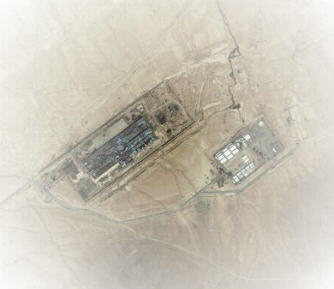
REVEALED
Senator Byrd:
"No President Is Above the Law"
December 30, 2005
"Through news reports,
we have been shocked to learn of the CIA's practice of rendition, and the
so-called 'black site" -- secret locations in foreign countries where abuse
and interrogation have been exported to escape the reach of U.S. laws protecting
against human rights abuses."
Black
Sites
Rights group alleges torture in Afghanistan Reuters By David Morgan, December 19, 2005 WASHINGTON -- A human rights group said yesterday that the United States operated a secret prison for terrorism suspects as recently as last year in Afghanistan, where detainees were subjected to torture and other mistreatment. The Bush administration has faced international criticism over detainees after a Nov. 2 article in The Washington Post said that the CIA held dozens of terrorism suspects in secret prisons called ''black sites" in countries around the world, including Eastern Europe. Human Rights Watch said eight detainees being held in the US military facility at Guantanamo Bay, Cuba, have told their attorneys that they were arrested separately in countries in Asia and the Middle East and flown to Afghanistan at various times between 2002 and 2004. |
Extraordinary
Rendition
EU to query US 'secret prisons' BBC News November 22, 2005 The European Union is to formally ask the US to clarify reports that it ran secret CIA prisons in eastern Europe. The US has refused to confirm or deny the reports, which surfaced in the US earlier this month. . . The Washington Post newspaper first reported on 2 November that the CIA had been using Soviet-era camps in eastern Europe to detain and interrogate terror suspects. It did not name the countries, but a day later Human Rights Watch said it had evidence indicating the CIA transported terror suspects captured in Afghanistan to Poland and Romania. Poland and Romania have denied the allegations. Last week, the Swedish government began an investigation to establish whether CIA prisoner flights had used Swedish airports. Spain is investigating similar claims about secret flights from Majorca while Iceland says it has asked the US for an explanation and is still awaiting a satisfactory answer. The CIA's controversial "extraordinary rendition" programme involves removing suspects without court approval to third party countries for interrogation. |
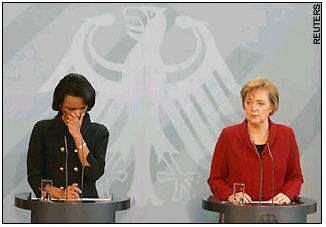
"The United States
does not transport, and has not transported, detainees from one country to
another for the purpose of interrogation using torture."
--
Condoleezza Rice
"Does anyone believe
Condoleezza Rice?"
-- headline
in German publication, Der Spiegel
CIA Holds Terror Suspects in Secret Prisons
Washington Post
Debate Is Growing Within
Agency About Legality and Morality of Overseas System Set Up After 9/11 |
U.S.
MILITARY
OR
Murderous
Maniacs?
Widespread Systematic
Torture Reported
October,
2005
Human Rights Watch
issued a shocking report in late September. The Associated Press said the
report is "based on interviews with a captain and two sergeants who served
in the Army's elite 82nd Airborne Division" and were stationed at a military
base called Mercury near Fallujah in Iraq.
According to the soldiers, prisoner abuse took place almost daily and often
came under orders. Anything short of causing an inmate's death was allowed,
they said. Detainees were allegedly deprived of sleep, food and water, subjected
to extreme heat and cold, stacked in human pyramids, beaten with bats, kicked
in the face, and had chemicals put on exposed skin.
The residents of Fallujah, 40 miles west of Baghdad, nicknamed soldiers at
the nearby base "the Murderous Maniacs." New York-based Human Rights
Watch said many of the soldiers at Mercury considered the name "a badge
of honor."
"These soldiers' firsthand accounts provide further evidence contradicting
claims that abuse of detainees by U.S. forces was isolated or spontaneous,"
the report said. "The accounts here suggest that the mistreatment of prisoners
by the U.S. military is even more widespread than has been acknowledged to
date, including among troops belonging to some of the best trained, most
decorated, and highly respected units in the U.S. Army."
The Army says it has now opened an investigation into the charges, making
it one of some 400 investigations into prisoner abuse allegations since the
Abu Ghraib scandal first broke. So far, about 250 soldiers have been
court-martialed or have faced non-judicial punishment for prisoner abuse.
![]()
THE LAST BAD
APPLE
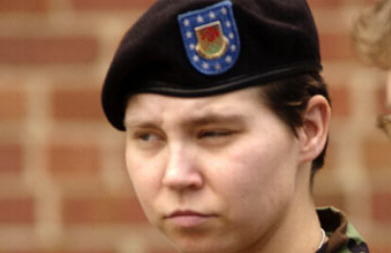
Lynndie
England
"I heard attacks were made
on coalition forces because of the photos.
I apologize to coalition forces and their families that lost their life
or were injured because of the photos."
-- Army Pfc. England
Lynndie England is no longer laughing. Well, at least she wasn't on
September 28, 2005 when she was escorted out of a courthouse with
her arms and legs in shackles. The U.S. soldier who's depraved antics made
her the poster child for detainee abuse at Abu Ghraib prison, had
herself just been sentenced to three years behind bars.
England had no words for the press but had earlier made remarks blaming Pvt.
Charles Graner Jr. for her actions. She explained she was only trying
to please her boyfriend when she took part in the crimes at Iraq's notorious
prison.
"I was used by Private Graner," she said. "I didn’t realize it at the
time."
"He was very charming, funny and at the time it looked to me like he was
interested in the same things I was. ... He made me feel good about myself,"
England said. "I trusted him and I loved him. ... Now I know it was just
an act to lure me in."
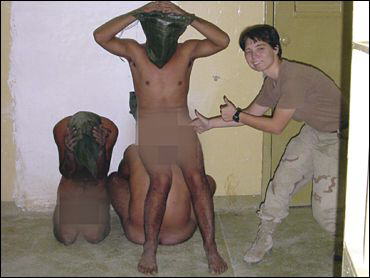
Lynndie England’s case was the last of the courts-martial of the "few bad apples" -- the nine low-level soldiers who were blamed for the entire Abu Ghraib prison scandal.
![]()
"THE GULAG OF OUR
TIME"
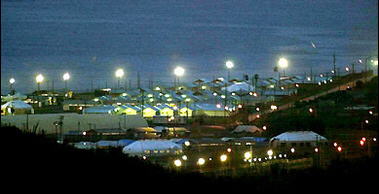
US Naval Base in
Guantanamo, Cuba
Camp
X-Ray
June,
2005
Some 540 men are being
held at Guantanamo Bay on suspicion of links to Afghanistan's ousted Taliban
government or the "Al Qaeda terror network." Some have been jailed for more
than three years without charge.
Amnesty International urged the U.S. to shut down the prison, calling
it "the gulag of our time." White House spokesman Scott McClellan said that
the human rights group's complaints were "unsupported by the facts" and that
allegations of mistreatment were being investigated.
In its annual report, Amnesty accused the United States of failing to live
up to its responsibility to set the standard for human rights protections.
Rather, the group said the United States has been the biggest disappointment
"after evidence came to light that the U.S. administration had sanctioned
interrogation techniques that violated the U.N. Convention against
Torture."
Bush is among a dozen
former or current U.S. officials -- including Donald Rumsfeld, Alberto Gonzales,
and George Tenet -- who should be probed by foreign governments because
Washington has failed to conduct "a genuinely independent and comprehensive
investigation" of torture allegations against U.S. troops, commanders, and
their civilian overseers, Schulz said.
Torture and other grave breaches of the Geneva Conventions amount to crimes
against humanity and therefore all states have a responsibility to investigate
and prosecute people responsible for them, Amnesty said in its 308-page report.
|
William Schulz, executive director of Amnesty International USA, in a statement launching Amnesty's annual report:
"If the U.S. government
continues to shirk its responsibility, Amnesty International calls on foreign
governments to uphold their obligations under international law by investigating
all senior U.S. officials involved in the torture scandal." |
"Absolutely
irresponsible."
-- General Richard Myers
about Amnesty International's report

"We regret that we
got any part of our story wrong, and extend our sympathies to victims of
the violence and to the U.S. soldiers caught in its
midst."
-- Newsweek Editor, Mark
Whitaker
U.S. Reputation in the
Toilet
In mid-May, 2005, Newsweek Magazine apologized to readers and acknowledged
errors in using a single anonymous source for a story about how U.S.
interrogators at Guantanamo Bay desecrated the Quran. Critics claimed Newsweek's
tiny "Periscope" item spawned protests in Afghanistan that left 15 dead and
scores injured.
Newsweek Washington Bureau Chief Daniel Klaidman said the magazine believes
it erred in reporting the allegation that a prison guard tried to flush the
Quran down a toilet.
Pentagon and White House officials initially insisted Newsweek's response
wasn't good enough.
Pentagon spokesman Bryan Whitman said the magazine's story was
"demonstrably false" and "irresponsible," and "had significant consequences
that reverberated throughout Muslim communities around the world."
The Defense Department argues that the detention prevents these enemy combatants
from fighting against the United States.
Pentagon spokesman Lawrence Di Rita said the charges of deliberate
Quran desecration by U.S. military personnel were "fantastic" and "not credible
on their face" because U.S. commanders were careful not to inflame passions
among the detainees.
"Commanders knew it was a very sensitive issue and they didn't need the trouble,"
he said.
White House spokesman, Scott McClellan, was up in arms. "While Newsweek
now acknowledges that they got the facts wrong, they refuse to retract the
story. I think there's a certain journalistic standard that should be met.
In this instance it was not." McClellan further stated, "the report has
had serious consequences. People have lost their lives. The image of the
United States abroad has been damaged."
McClellan said, the White House wants Newsweek "to help repair the damage"
by explaining "what happened and why they got it wrong, particularly to people
in the region." Newsweek "can also talk about policies and practices of the
United States military," which "goes out of its way to treat the holy Quran
with great care and respect," he said.
"The Quran is handled with great care and there are very strict guidelines
when it comes to that. There are some who are opposed to the United States
who have used this report to mischaracterize our views and the values that
we want to uphold in the United States and so I think now it is one of their
responsibilities to help repair some of the damage that was done," McClellan
added.
Pentagon Admits Abuse
The focus on Newsweek Magazine's mistakes quickly faded when, in late May,
the Pentagon admitted to several charges of prisoner abuse.
U.S. military officials acknowledged that a copy of the Quran was splashed
with urine at the Guantanamo Bay prison camp.
Among other newly disclosed incidents cited in the Pentagon report on the
mishandling of the sacred text at the prison were reports that a detainee's
Quran was deliberately kicked and another's was stepped on.
In another confirmed incident cited in the report, water balloons thrown
by prison guards caused an unspecified number of Qurans to get wet, and in
a confirmed but ambiguous case, a two-word obscenity was written in English
on the inside cover of a Quran.
A written statement released with the new details says the investigation
"revealed a consistent, documented policy of dis-respectful handling of
the Quran dating back almost two and a half years."
ACLU officials said the newly declassified documents provide evidence
that U.S. authorities at Guantanamo Bay were mistreating symbols of the
detainees' religious beliefs as a tactic to force them to talk.
"The United States government continues to turn a blind eye to mounting evidence
of widespread abuse of detainees held in its custody," said ACLU Executive
Director Anthony D. Romero. "If we are to truly repair America's standing
in the world, the Bush administration must hold accountable high-ranking
officials who allow the continuing abuse and torture of detainees."
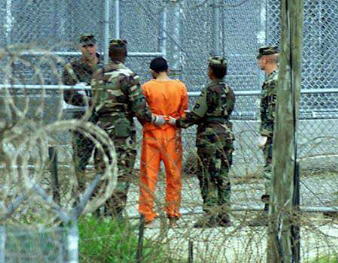
White House
Hypocrisy
Rep. Pete Stark charged the White House with hypocrisy, saying, "The
administration is chastising Newsweek for a story that contained a fact that
turned out to be false. This is the same administration that lied to the
Congress, the United Nations and the American people by fabricating reasons
to send us to war."
Stark also said in an interview: "For the administration to be holier-than-thou
about this is somewhere between obscene and funny. There are publications
that often expose weaknesses in administration positions and they don't like
that. They play tough."
McClellan rejected such criticism, saying in an interview, "We've taken steps
to make sure we improve our intelligence gathering. This should not be used
as a distraction from what occurred here. It gave an impression of our military
that is wrong."
"People need to be
careful what they say, just as people need to be careful what they do."
-- Donald Rumsfeld about
Newsweek
![]()
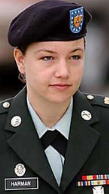 Easy Time
Easy Time
U.S. Army Spc. Sabrina Harman was found guilty May 16, 2005 on six
of seven charges she faced for the mistreatment on prisoners at the Abu Gharib
prison. Harman was only sentenced to six months in
prison.
The Last Laugh
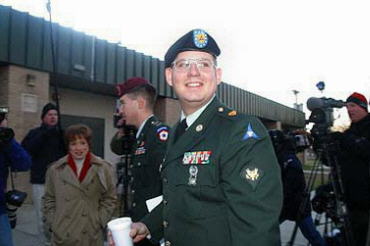
Army Reserve Spc.
Charles Graner Jr.
sentenced to 10 years in military prison for
his role in abusing detainees at Abu Ghraib
FORT HOOD, Texas
January, 2005
Spc. Charles Graner's
defense attorney, Guy Womack, argued that the images in the infamous Abu
Ghraib photographs weren't as bad as they looked, saying cheerleaders make
human pyramids in their dance routines and that parents sometimes put leashes
on their children while shopping in malls.
Prosecuting attorney Capt. Chris Graveline said, "What we have here is plain
abuse, no doubt about it. There is no justification."
Graveline accused Graner of being a ringleader in the physical abuse and
sexual humiliation of prisoners at Abu Ghraib. One of Graner's victims, a
Syrian prisoner, testified that Graner was the top torturer in the prison.
Graner disagreed.
"We were called to violate the Geneva Convention. We were asked to do
certain things I wasn't trained to do," Graner said during two-and-a-half
hours on the witness stand, where he swore he was only obeying orders and
following the lead of his superiors.
"A lot of the weird stuff came from civilian contractors," he said, adding
that "crazy stuff" was also ordered by military intelligence soldiers.
Charles Graner, from Uniontown, Pennsylvania, was the first to face trial
of the seven military guards charged in connection with the abuses at Abu
Ghraib.
Three of those guards - all from the 372nd Military Police Company - have
pleaded guilty without going to trial: Staff Sgt. Ivan Frederick II, 37,
of Buckingham, Virginia; Spc. Jeremy Sivits, 24, of Fort Ashby, West Virginia;
and Spc. Megan Ambuhl, 29, of Centreville, Virginia.
After jurors found Graner guilty of 10 charges -- including aggravated assault,
maltreatment and conspiracy -- he turned to his attorney and said: "That's
what makes the world go around," and laughed slightly.
Graner, 36, is now headed for prison himself. He will serve out his sentence
as a private with no salary and be dishonorably discharged upon release.
After the Guilty verdict was handed down, reporters asked Graner how he expected
to be treated in prison. With no hint of humor in his voice, Graner flatly
replied, "With respect."
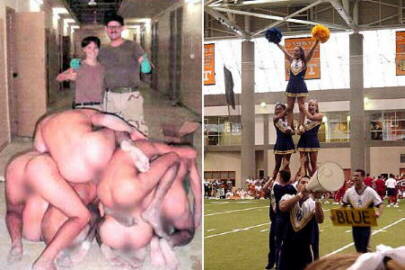
Witness says CIA
and SEALs
beat prisoners during interrogation
A former Navy SEAL says he saw fellow SEALs and CIA officials kick, choke
and eye-gouge detainees at a U.S. military base in Iraq. The Navy SEAL, who
was not identified, was the government's main witness at an "Article 32"
hearing on January 19, 2005.
The hearing, the military equivalent of a civilian grand jury, was for a
Navy SEAL lieutenant who is accused of assault, maltreatment and conduct
unbecoming an officer for his handling of detainees at Camp Jenny Pozzi,
the SEAL base at Baghdad International Airport.
Sergeant Gets Six
Months in
Iraqi drowning case
On January 15, 2005,
Army platoon sergeant 1st Class Tracy Perkins was sentenced to six months
in military prison for ordering his soldiers to push two Iraqis into the
Tigris River in January 2004. Prosecutors said Zaidoun Hassoun, 19, drowned
and his cousin, Marwan Hassoun, climbed out the river.
Perkins was convicted on two counts of aggravated assault, assault consummated
by battery and obstruction of justice, but was acquitted of involuntary
manslaughter.
Although Perkins admitted he ordered his soldiers to throw the men into the
river, he said he just wanted to teach a "hard lesson" about threatening
U.S. troops.
"Basically the enemy would test your resolve. ... I didn't want them to think
we were soft or weak," said Perkins.
Despite the conviction, Lt. Col. Nathan Sassaman told reporters, "I will
always consider him a war hero. ... No one can ever take away his outstanding
service over there."
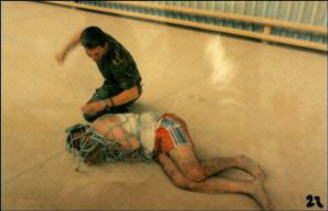
Lance Corporal Mark Cooley with
his fist raised above an Iraqi detainee
Britain's Prime Minister Tony Blair described his disgust at photos showing
abuse of Iraqi civilians, as news of the courts martial of soldiers accused
of carrying out the abuse stunned and shamed the nation in January of 2005.
| Red Cross: Abuse At
Guantanamo November 30, 2004
GENEVA (AP) The International
Committee of the Red Cross said U.S. officials have failed to address concerns
about significant problems in the treatment of terror suspects detained at
the U.S. military prison in Guantanamo Bay, Cuba. |
| US Army generals told of
prisoner abuse before Abu Ghraib photos
December 30, 2004
WASHINGTON (AFP) - One
month before the Abu Ghraib scandal broke, US Army generals were reportedly
told that elite military units and CIA agents were abusing detainees and
"making gratuitous enemies" in Iraq. |
The Church report
The Herrington report
was cited in an as yet unreleased investigation by Vice Admiral Albert Church,
the Navy's inspector general who has been examining detainee operations across
the military, he said. The Church report, a draft of which is under review
at the Pentagon, will probably not be made public for several weeks, DiRita
said on late November, 2004.
![]()
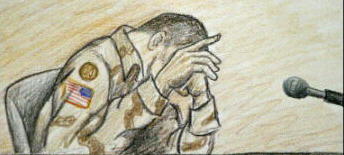
court martial of public opinion
As of October 2004, the Pentagon says 45 soldiers
have been "referred" for court martial and 12 officers
have been "served letters of reprimand, in effect
ending their careers."
Pfc. Lynndie R. England gave birth October 10, 2004.
Spc. Charles Graner, is repoted to be the father.
The Center for Public Integrity,
a Washington, D.C.-based government watchdog group has published the
entire
classified Army report about the Abu Ghraib prison scandal.
Previously only the executive summary of the "Taguba Report" -- so called
because it was carried out by Maj. Gen. Antonio Taguba -- was publicly available.
CHAIN OF COMMAND
Rumsfeld was warned |
![]()
America
On Trial
Background Page - 2
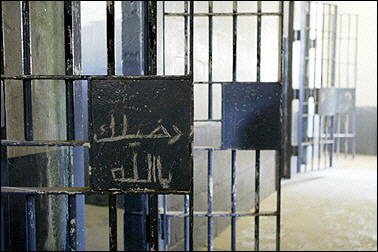
| Vance Holmes.com / court |
| And Poetic Justice For All |